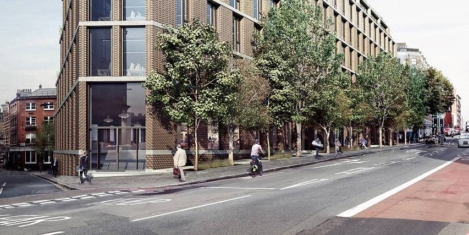To provide the best experiences, we use technologies like cookies to store and/or access device information. Consenting to these technologies will allow us to process data such as browsing behaviour or unique IDs on this site. Not consenting or withdrawing consent, may adversely affect certain features and functions.
The technical storage or access is strictly necessary for the legitimate purpose of enabling the use of a specific service explicitly requested by the subscriber or user, or for the sole purpose of carrying out the transmission of a communication over an electronic communications network.
The technical storage or access is necessary for the legitimate purpose of storing preferences that are not requested by the subscriber or user.
The technical storage or access that is used exclusively for statistical purposes.
The technical storage or access that is used exclusively for anonymous statistical purposes. Without a subpoena, voluntary compliance on the part of your Internet Service Provider, or additional records from a third party, information stored or retrieved for this purpose alone cannot usually be used to identify you.
The technical storage or access is required to create user profiles to send advertising, or to track the user on a website or across several websites for similar marketing purposes.
 Tech giantLinkedIn has sealed a deal for its new London headquarters, pre-letting the entirety of a building in North East London that was once home to The Guardian newspaper. LinkedIn has taken 83,000 square feet at The Ray Farringdon, at 119 Farringdon Road, according to a statement from Viridis Real Estate Services, which is redeveloping the property.
Tech giantLinkedIn has sealed a deal for its new London headquarters, pre-letting the entirety of a building in North East London that was once home to The Guardian newspaper. LinkedIn has taken 83,000 square feet at The Ray Farringdon, at 119 Farringdon Road, according to a statement from Viridis Real Estate Services, which is redeveloping the property.










 Employers considering new flexible working options for their employees are concerned about the security and management implications, according to a recent poll, despite the fact that staff now have the legal right to request flexible arrangements. The survey of medium sized businesses, carried out for RSM by YouGov, found that over the next five years, three quarters of respondents were considering introducing flexible terms of employment, allowing workers to work outside 9 to 5 or increasing the use of remote working.
Employers considering new flexible working options for their employees are concerned about the security and management implications, according to a recent poll, despite the fact that staff now have the legal right to request flexible arrangements. The survey of medium sized businesses, carried out for RSM by YouGov, found that over the next five years, three quarters of respondents were considering introducing flexible terms of employment, allowing workers to work outside 9 to 5 or increasing the use of remote working.






 UK workers are feeling more confident about the state of the economy but it’s making them less inclined to stay in their current jobs, a new survey claims. According to the latest Global Talent Monitor report for the second quarter of this year, from Gartner 18.8 percent of UK employees indicated a very low intent to stay in their current role, the second highest after India (40 percent), and higher than the global average of nearly 12 percent. This is the first time since Brexit that workers reported having an optimistic outlook on the job market, and their own career growth. Nearly 40 percent of UK employees reported somewhat high to high confidence in the economy. When it comes to their personal prospects, employee perceptions have risen steadily over the last year and have increased nearly 4 percent. In fact, job opportunity perceptions in the UK are nearly 1.5 points higher than the global average. However, despite their intentions to move on from their current role, UK employees are still putting in a strong effort in their current roles, with nearly 13 percent of employees reporting a high willingness to go above and beyond in their role, and an additional 43.8 percent leaning towards high.
UK workers are feeling more confident about the state of the economy but it’s making them less inclined to stay in their current jobs, a new survey claims. According to the latest Global Talent Monitor report for the second quarter of this year, from Gartner 18.8 percent of UK employees indicated a very low intent to stay in their current role, the second highest after India (40 percent), and higher than the global average of nearly 12 percent. This is the first time since Brexit that workers reported having an optimistic outlook on the job market, and their own career growth. Nearly 40 percent of UK employees reported somewhat high to high confidence in the economy. When it comes to their personal prospects, employee perceptions have risen steadily over the last year and have increased nearly 4 percent. In fact, job opportunity perceptions in the UK are nearly 1.5 points higher than the global average. However, despite their intentions to move on from their current role, UK employees are still putting in a strong effort in their current roles, with nearly 13 percent of employees reporting a high willingness to go above and beyond in their role, and an additional 43.8 percent leaning towards high.












September 14, 2018
All those workplace trends lists that you see? We’ve been there before 0
by Mark Eltringham • Comment, Facilities management, Furniture, Workplace design
(more…)